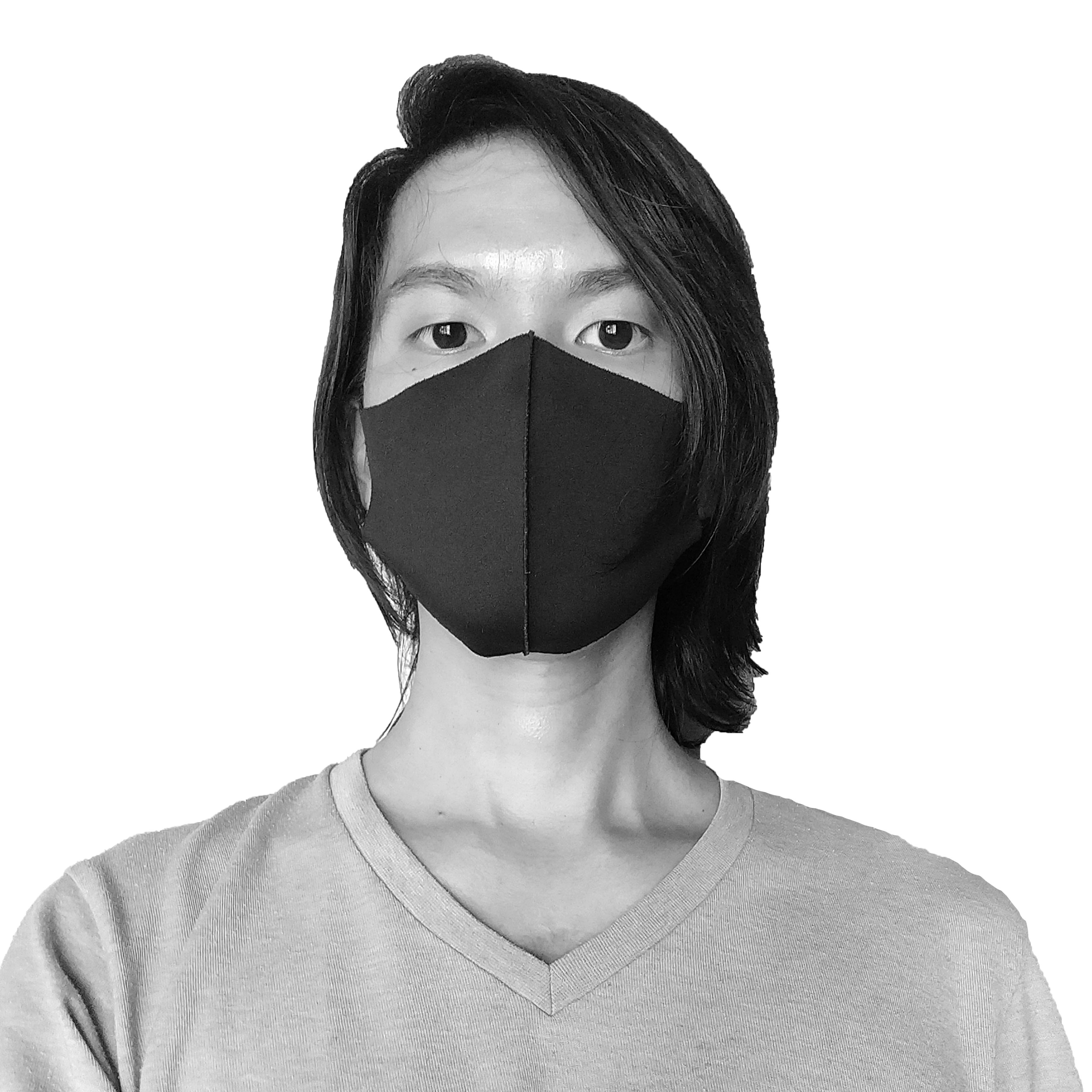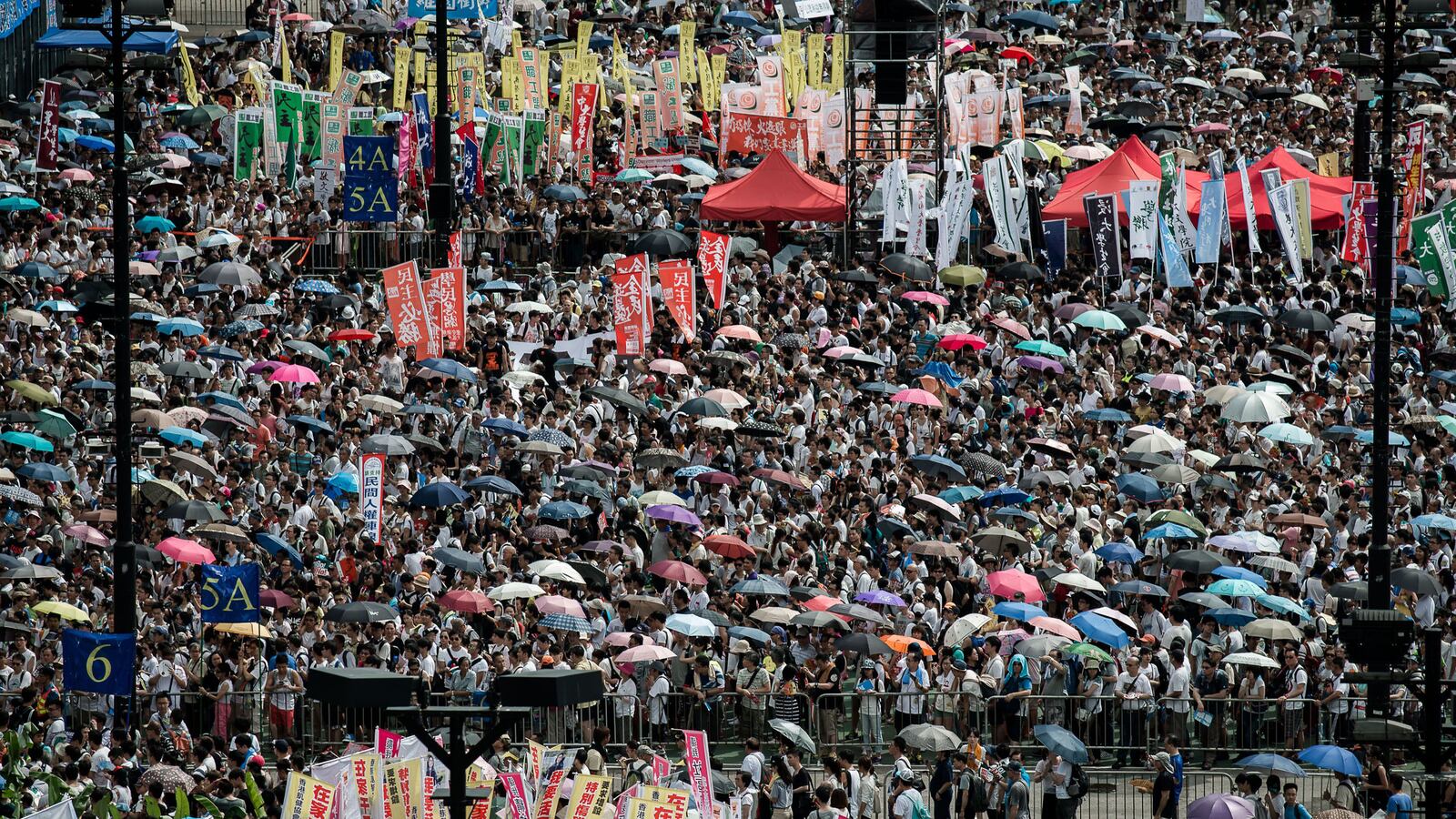HONG KONG, China — The morning started with activists burning the portrait of the city’s top political leader.
Fueled by growing discontent with Beijing’s creeping control of their city’s politics, Hongkongers hit the streets today. Pro-democracy activists estimate that some half a million citizens joined them in the largest local protest in over a decade. “It’s our government, it’s our choice!” They yelled, “It’s our Hong Kong, it’s ours to save!” Others observed from pedestrian lanes and footbridges as the march progressed on Hong Kong Island. In some cases, spectators hoisted banners of their own. Shops closed and police barricades went up in Hong Kong’s financial district in anticipation of the arrival of protestors affiliated with the Occupy movement, with 2,500 police officers awaiting the procession’s arrival.
The pro-Beijing camp had their own counter-demonstration, a distinct minority protected by police officers. Pro-democracy demonstrators put their middle fingers up in the air as they walked by.
Then it started to rain.
Four days prior, 1,800 lawyers marched through the city in protest at Chinese interference. They were concerned about political meddling originating from Beijing that was bleeding into local governance and the rule of law. Last month, China’s State Council issued a white paper that made waves, stating that the city’s administrators, including judges, must “love the country.”
The 14,500-word document caused further consternation by stating that “many wrong views are currently rife in Hong Kong” regarding the “one country, two systems” principle, which is supposed to preserve Hong Kong’s free-market economy and existing political system, with the exception of foreign and defense affairs. The paper emphasized the Central People’s Government’s total control over Hong Kong, and treated its high degree of autonomy as a gift that could be taken away. It “is not an inherent power, but one that comes solely from the authorization by the central leadership.”
Part of China, but separate—if there ever was a city that resembled Schrödinger’s cat (simultaneously in two contradicting states), Hong Kong would fit the bill.
The July 1 march is an annual affair. Pro-democracy politicians and grassroots civil organizations have been organizing the protests since Hong Kong was returned from British colonial rule to Chinese sovereignty in 1997, but participating numbers have steadily increased in recent years as Hongkongers see that promises made by the central government remain unfulfilled.
Aside from the student-led demonstrations that took place in Beijing’s Tiananmen Square in 1989, then branded as “counter-revolutionary riots” by hardline conservatives, no other Chinese city has ever seen open dissent like that which is in Hong Kong. For the record, the Hong Kong police said there were 98,600 protestors marching on Tuesday, but the official Chinese network CCTV allowed as how there were 300,000, supposedly celebrating the anniversary of the handover. The protest leaders felt quite confident saying there were 500,000.
At the July 1 marches, scuffles between protestors and pro-Beijing groups or police officers are common. This year, police limited the number of traffic lanes that the rally could pass through, paralyzing the procession and causing major congestion as it crawled through the city. By 8:30 pm, police officers were blocking some protestors from continuing on their permitted route.
In anticipation of this year’s march, police set up makeshift detention centers in case they make mass arrests.
Participants voice a grab bag of concerns, but all see universal suffrage as one of their basic rights and the main issue of the day. The Basic Law—Hong Kong’s constitutional document—guarantees universal suffrage as the ultimate phase of the city’s political evolution, but lays out no timeline for direct elections.
For years, Hongkongers have been demanding the vote, but the city’s top political leadership has continued to delay implementation. The lack of meaningful progress has led many Hongkongers to view their government’s executive branch as an impediment to political reform.
To fill the vacuum, the University of Hong Kong’s Public Opinion Program, in conjunction with the local Occupy movement, put forward PopVote, a virtual referendum where voters can say how they would like universal suffrage to be implemented. The move is unimaginable in Mainland China, with nearly 800,000 votes cast during the ten-day voting period in late June, far exceeding initial expectations.
Beijing is not happy about this development. The Xinhua News Agency and pro-Beijing groups in Hong Kong say that PopVote is illegal and invalid. Chinese state media outlet The Global Times called PopVote “an invention mincing with ludicrousness,” and called those behind the informal referendum a “radical opposition [that] is splitting China.” On its Chinese site, The Global Times published an op-ed (link in Chinese) arguing that the 1.3 billion citizens of Mainland China should have their say on the issues of Hong Kong’s political reform, and that democratic referendums can only lead to pandemic chaos.
The writers at The Global Times have likely never had the opportunity to cast a vote for anything, ever.
Before and during its voting period, PopVote became the target of a series of cyber attacks. Cloudflare, the web performance company that maintains PopVote’s website, said it was “one of the largest DDoS [distributed denial of service] attacks in Internet history”.
Part of the attacks were traced back to the computers of Mainland Chinese firms in Hong Kong, but were triggered by hackers in unknown locations.
The Chinese government has stated that Hongkongers will have direct elections by 2017 to choose the city’s leader, which would be the most experimental that the central government has ever been with democratic reforms. The catch is that Hong Kong’s chief executive must be chosen from a pool of candidates who “must love China” and are endorsed by a nominating committee. Hongkongers see the nomination committee as a collection of pro-Beijing elites, and believe that all candidates put forth by the committee in future elections will be puppets of Beijing, providing the illusion of choice.
In the conflict between the pro-Beijing camp and pro-democracy activists of Hong Kong, who are the architects of Hong Kong’s political future? While the creation of PopVote is an interesting development that caught Beijing off guard, it bears no legal weight. Beijing’s recent political maneuverings in Hong Kong have received push backs from locals, triggering hunger strikes, growing demonstrations, and increasingly vocal dissatisfaction, while Hong Kong’s own political leadership is comfortable in its inertia. The current top government official in Hong Kong, Leung Chun Ying, is widely considered to be a Beijing loyalist whose policies are shaped by the Central People’s Government.
When prompted with the question, one of the rally’s organizers said, “We’re doing the right thing. We’re civil, we’re safe, and the government has no logical reason to ignore our pleas. Hopefully, they’re not deaf. But if they say we’re doing something illegal, they can arrest us all.” Then she pointed to the crowd that was shuffling ahead at the speed of snails, cooled down by the torrential rain, as many as half a million strong.





